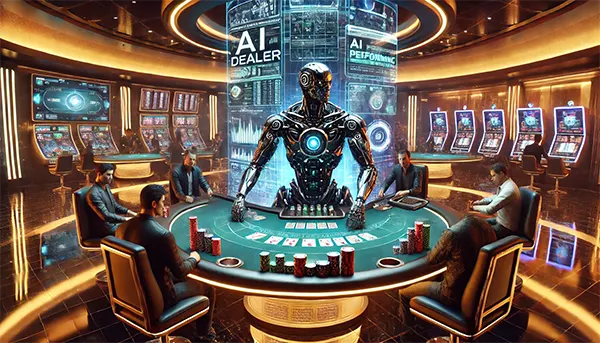
Artificial Intelligence and Poker: Is It Possible to Beat Bots in 2025?
Artificial intelligence (AI) has revolutionised various industries, and poker is no exception. The rise of poker bots has led to an ongoing debate: can human players still outplay AI in 2025? With advancements in machine learning and computational power, poker bots have become more sophisticated, making the game more challenging than ever.
The Evolution of Poker Bots and Their Capabilities
Poker bots have undergone significant improvements over the years, transforming from simple rule-based programs into complex AI systems capable of deep learning. Early bots relied on predefined strategies, often making them predictable and easy to exploit. However, modern AI-driven bots, such as Pluribus and Libratus, employ neural networks and reinforcement learning to adapt and refine their gameplay dynamically.
In 2017, Libratus made headlines by defeating professional poker players in no-limit Texas Hold’em. Its success demonstrated AI’s ability to perform optimally in imperfect-information games. Since then, newer AI models have emerged, incorporating even more advanced strategies, including real-time decision-making and bluffing techniques that mimic human behaviour.
By 2025, poker bots have reached unprecedented levels of efficiency, making it increasingly difficult for human players to detect and counteract them. These bots analyse vast datasets, identify opponents’ tendencies, and execute mathematically optimal moves with near-perfect precision.
How Poker Bots Gain an Advantage Over Humans
One of the primary strengths of AI poker bots is their ability to process and evaluate probabilities instantly. While human players rely on intuition and experience, bots use real-time data analysis to assess the most profitable moves based on historical hands and mathematical probabilities.
Another key advantage is their immunity to emotional decision-making. Human players are prone to tilt—a state of emotional distress that leads to poor decisions. Bots, on the other hand, remain consistent and disciplined, executing strategies without hesitation or bias.
Moreover, AI-driven bots can multi-table efficiently, playing multiple hands simultaneously without losing focus. This gives them a significant edge in online poker environments, where multitabling is common among professional players.
Can Human Players Still Compete Against AI in 2025?
Despite the impressive advancements in poker bots, human players still have avenues to remain competitive. While AI excels in strategy execution, it lacks genuine creativity and psychological intuition. Some professional players have developed counterstrategies to exploit AI’s predictable tendencies, such as deviating from standard play and implementing unconventional tactics.
Another approach to counter AI is to leverage game theory optimal (GTO) strategies. Many top-tier players study GTO concepts, which focus on balanced and unexploitable play. By minimising their own weaknesses, human players can limit the advantage of AI opponents.
Additionally, poker rooms and gaming platforms have implemented security measures to detect and ban AI-driven bots. Advanced bot detection algorithms analyse playing patterns, identifying unnatural consistency and suspicious betting behaviours that indicate non-human play.
The Role of Ethics and Regulations in AI Poker
The rise of AI in poker has sparked ethical and regulatory discussions. Many gaming platforms prohibit the use of poker bots, as they undermine fair competition. Some online casinos deploy AI-driven surveillance systems to detect unauthorised bot usage and maintain a level playing field.
Regulators have also started addressing the potential risks associated with AI in gambling. Policies are being introduced to ensure responsible AI use, preventing fraudulent practices and protecting casual players from unfair competition.
As AI continues to evolve, the challenge remains in balancing technological advancements with the integrity of the game. Players and operators must adapt to ensure poker remains a skill-based game rather than a purely computational contest.

The Future of AI in Poker: What Lies Ahead?
Looking ahead, AI is likely to become an even more integral part of poker. AI-powered tools are being developed to assist players in analysing hands, improving decision-making, and optimising strategies. These tools are increasingly accessible, allowing players to harness AI capabilities to enhance their gameplay.
Moreover, AI is reshaping poker training methodologies. Instead of relying solely on human coaching, players now have access to AI simulations that provide real-time feedback and scenario-based learning. This democratises high-level poker education, bridging the gap between amateurs and professionals.
However, the ongoing AI arms race means that poker bots will continue to evolve. The challenge for human players is to stay ahead by innovating, adapting, and leveraging technology to their advantage.
Conclusion: The Ongoing Battle Between Man and Machine
As of 2025, AI-powered poker bots have proven to be formidable opponents, capable of outperforming even the best human players. However, poker remains a dynamic game where adaptability, creativity, and strategic depth still matter. While AI may dominate in technical execution, human ingenuity ensures that the battle between man and machine is far from over.
For players, understanding how AI functions and developing counterstrategies is key to staying competitive. Whether through GTO play, psychological tactics, or leveraging AI-assisted training, there are still ways to challenge the dominance of poker bots. The future of poker will be shaped by the interplay between artificial intelligence and human skill, ensuring that the game remains both challenging and exciting.
Popular topics
-
 EPT and FPS Monte-Carlo 2024: Poker&#...
EPT and FPS Monte-Carlo 2024: Poker&#...As the poker world turns its attention to the …
-
 Masters of the Short-Handed Felt: Unv...
Masters of the Short-Handed Felt: Unv...Short-handed poker, a dynamic and thrilling variant of the …
-
 Playing H.O.R.S.E. Poker
Playing H.O.R.S.E. PokerH.O.R.S.E. Poker is a unique and complex type of …
